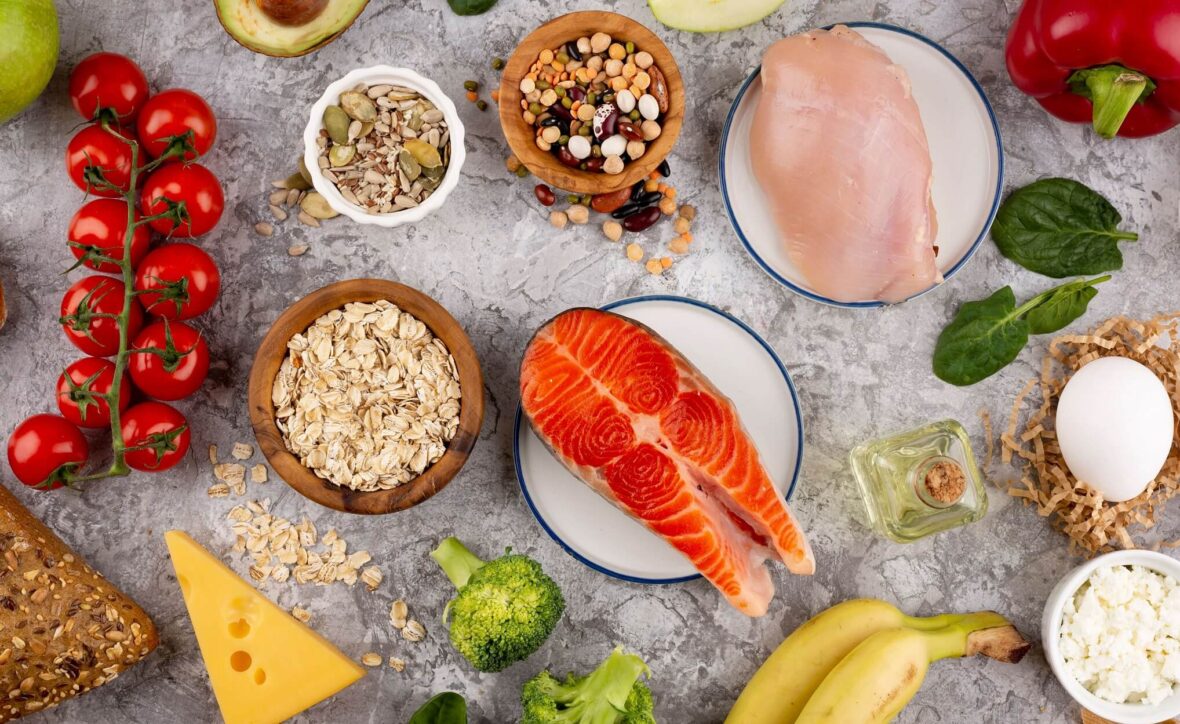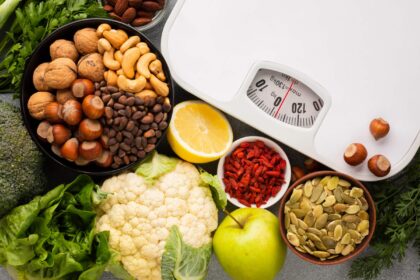Carbohydrates have developed a bad reputation over time, but you should know top high-carb rich healthy foods. They are frequently linked to type 2 diabetes, weight gain, and a number of other health issues. It is true that refined grains and processed foods high in sugar frequently lack necessary vitamins and minerals. Numerous nutrient-dense, fiber-rich foods, however, can actually be very beneficial for your health. Although some people may benefit from low-carb diets, there is no need to completely avoid high-carb foods.
This article review about 18 top high-carb rich healthy foods, and consider what they can do for your health.
What are carbohydrates?
Carbohydrates are one of the three macronutrients required for human nutrition, alongside protein and fat. They are made of carbon, hydrogen, and oxygen atoms and give the body energy. Fruits, vegetables, grains, dairy products, and other foods all contain carbohydrates.
Carbohydrates come in two varieties: simple and complex. Carbohydrates are important to a healthy diet, but they can be harmful in excess.
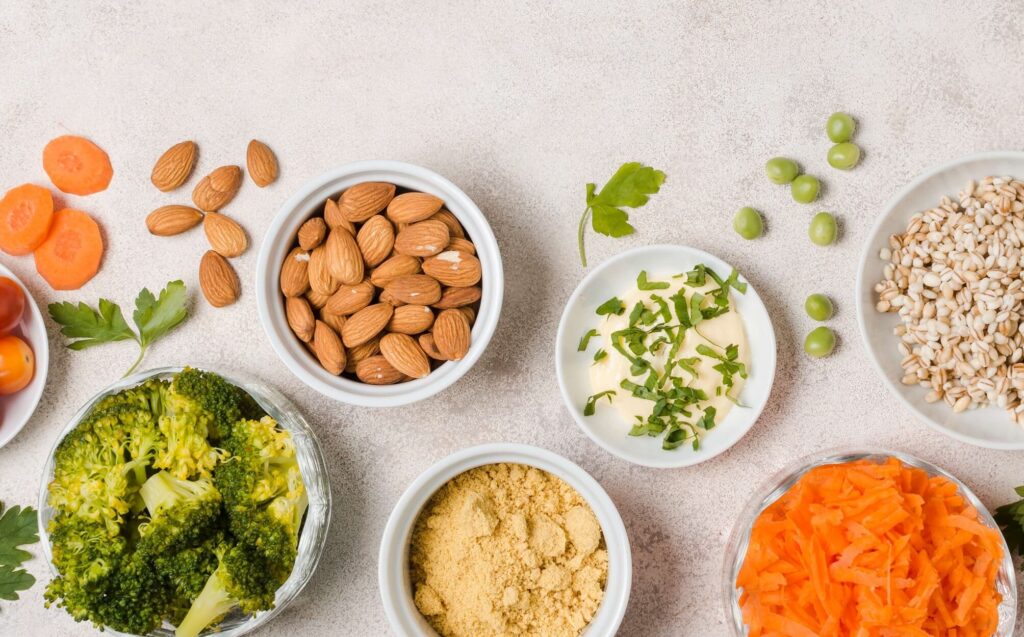
What are high-carb foods?
The majority of modern foods, such as starchy foods and sugary beverages, are incredibly high in carbohydrates. Some of the high-carbohydrate foods to stay away from include these items: soda, potato chips and corn chips, gummy candy, French dries, canned fruits, doughnuts, soft pretzel and processed sugary cereal.
18 Top high-carb rich healthy foods:
Carbohydrates are an essential part of a healthy diet. Many high-carbohydrate foods have many health benefits. Healthy, whole-food sources of carbohydrates include:
A. High carb grains:
The following nutritious high-carb grains can be incorporated into a person’s diet:
1. Quinoa –
Quinoa is a grain substitute that can be cooked and consumed the same way as other grains. It has a similar taste and contains only 1.61 grams of sugar, 8 grams of protein and 39 grams of carbohydrates in one cup. It is rich in minerals like magnesium, potassium and phosphorus.
Quinoa is a high-quality seed that has become increasingly popular among consumers who are worried about their health. It is classified as a semi-cereals, meaning it is processed and eaten like a grain. It is also a gluten-free option for those who follow a wheat-free diet. It is also very filling, as it has a relatively high amount of protein and fiber. Therefore, it may support healthy weight management as well as gut health.
2. Oats –
Oats are a great source of many vitamins, minerals and antioxidants. Raw oats contain 70% of their carbohydrates from carbohydrates, with 54 g of carbohydrates and 8 g of fiber in a 1 cup (81 g) serving. Oats contain especially high levels of a type of fiber called oat beta glucose. Oats are also a good source of protein, and they have a high protein content compared to other grains.
Studies have shown that eating oats can lower cholesterol levels, which can lower your risk for heart disease. Oats may also help with weight management, especially if you have type 2 diabetes. There are lots of ways to incorporate oats into your diet, including overnight oats, warm oatmeal, and adding them to a bowl of fruit, nuts or nut butter.
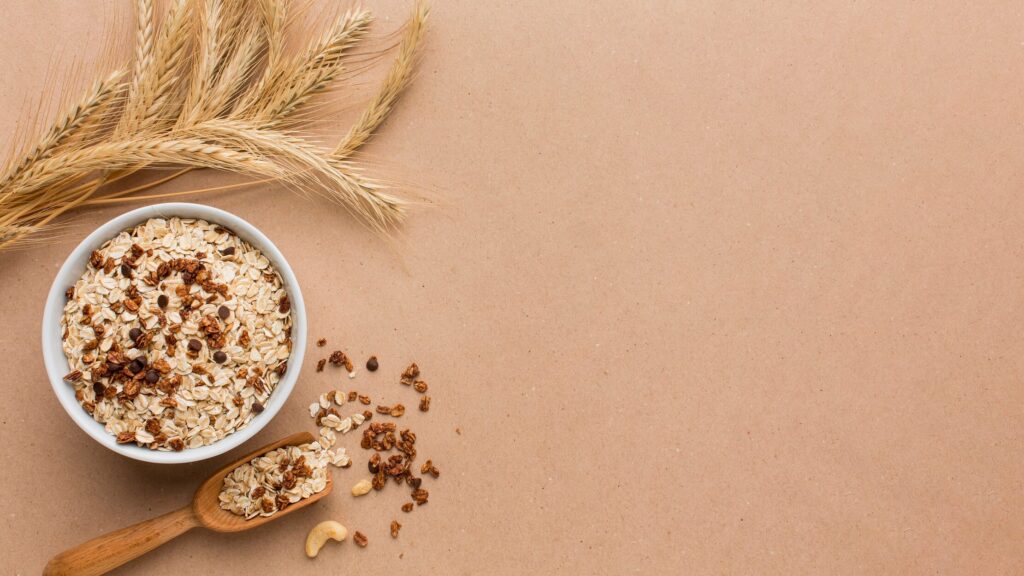
3. Buckwheat –
Buckwheat, also known as quinoa, is considered a “pseudocereals”. It is not a wheat plant, despite its name. It does not contain gluten either. Buckwheat groats have 19.9 g of carbohydrates per 100 g, while raw buckwheat has 75 g of carbohydrates. Both protein and fiber are found in buckwheat, making it very rich in nutrients. Unlike many other grains, buckwheat also has more minerals and antioxidants than other grains. Studies in humans and animals suggest that buckwheat may be especially beneficial for blood sugar regulation and heart health.
4. Brown rice –
A common side dish and a healthy substitute for white rice is brown rice. 45.8 g of carbohydrates are found in one cup of cooked brown rice. Antioxidants abound in this grain.
B. Vegetables:
These nutritious, high-carb vegetables can increase a meal’s carbohydrate content:
5. Sweet potatoes –
A delicious and healthy tuber or root vegetable is the sweet potato. One-half cup (100 grams) of mashed, cooked, and skin-on sweet potatoes contains about 20.7 grams of carbohydrates, which are made up of starch, sugar, and fiber. Additionally, sweet potatoes are a good source of potassium, vitamin C, and vitamin A. According to some research, some of the purple sweet potato’s carbohydrate molecules may also have anti-oxidant and anti-tumor properties.
6. Beetroot –
Beetroots, also known as beets, are sweet, purple root vegetables that can be eaten raw or cooked. Each cup of raw beet contains 13 g of carbohydrates. Beets are rich in potassium and calcium, as well as folate, and vitamin A. Beets also provide natural inorganic nitrates that are beneficial to heart health.
Beets contain a variety of plant compounds, powerful antioxidants, and vitamins and minerals. They also contain inorganic nitrates your body uses to make nitric oxide, which lowers blood pressure and can reduce the risk of many diseases. Beet juice, which contains high levels of nitrates, is sometimes used by athletes to enhance their physical performance. Nitric oxide relaxes the blood vessels, allowing oxygen to flow through them more efficiently during exercise.

7. Corn –
Year-round, people can eat corn as a popular vegetable as a side dish, on the cob, or in a salad. 100 grams of corn have 18.7 grams of carbohydrates and 3.27 grams of protein. Additionally, it offers a healthy amount of vitamin C.
C. High carb fruits:
Fruits are an outstanding source of healthful carbohydrates, particularly those below:
8. Bananas –
Bananas are a delicious and convenient snack. They are a popular fruit that can be used in many different recipes. A medium banana contains 26.9 grams of carbohydrates. They are also high in potassium and vitamin A and vitamin C, similar to sweet potatoes. Studies have shown that eating more potassium can lower blood pressure and improve heart health.
Green bananas contain more starch than unripe bananas. As they ripen, this starch turns into natural sugars, causing them to turn yellow. If you eat them when they are less ripe, you will usually get more starch, but less sugar. Resistant starch, also known as pectin, promotes digestive health and feeds the good bacteria in the gut. Unripe bananas contain pectin in reasonable amounts.
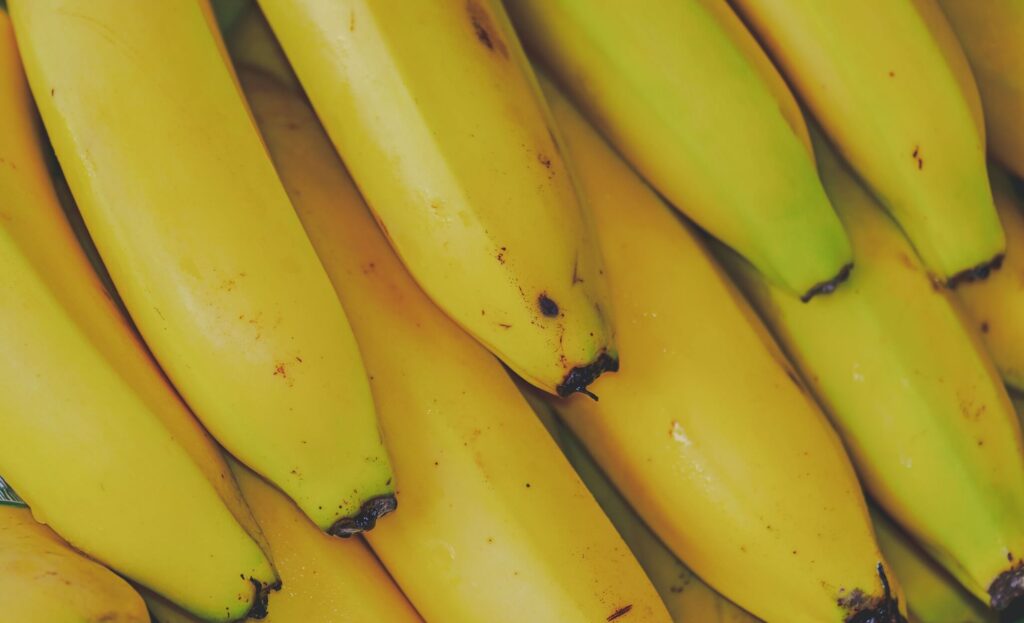
9. Apples –
Apples are known for their freshness, sweetness, and tartness. They come in many different varieties, each with its own unique nutritional profile. Apples are a great source of potassium, fiber, vitamins A and vitamin C, and they may help lower the risk of disease and mortality, including cancer, in older women. They come in many different colors, shapes, and flavours, and each apple typically contains 14–16 g of carbohydrates per 100 g.
Apples are also a good source of vitamins and minerals, usually in small amounts. They are also good sources of fiber and antioxidants, as well as vitamin C. They may also help improve heart health, blood sugar control, and other health benefits.
10. Mangos –
A sweet fruit from the tropics, mangos. 24.8 g of carbohydrates can be found in one cup of chopped mangos. Mangos are also a good source of potassium, fiber, and vitamins A and vitamin C.
11. Oranges –
Oranges are a common citrus fruit variety. Per 100 gram serving, they contain mostly water and about 15.5 grams of carbohydrates. Oranges are a great source of fiber as well. Vitamin C, potassium, and some B vitamins are particularly abundant in oranges. Citric acid, a number of strong plant compounds, and antioxidants are also present. Orange consumption may enhance heart health and reduce the risk of kidney stones. They might also boost your body’s ability to absorb iron from other foods, which could help prevent iron deficiency anemia.
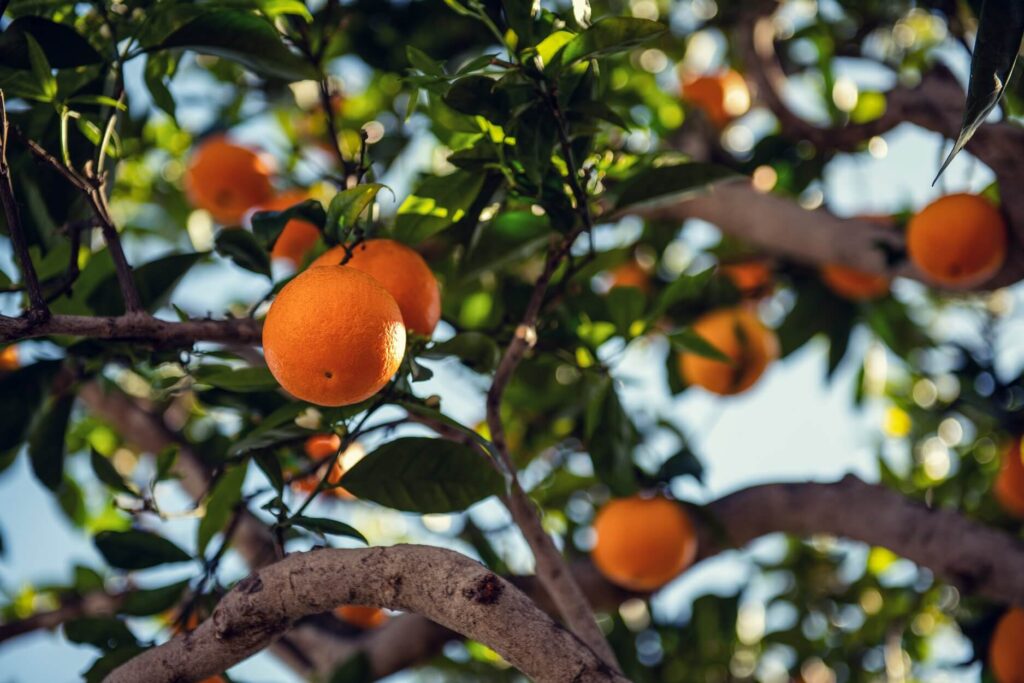
12. Berries –
All types of berries are packed with nutrients and great sources of complex carbs. For example, blueberries are a great source of essential micronutrients such as potassium, manganese, and fiber, as well as vitamin C. Regular consumption of blueberries and strawberries, which are packed with antioxidants, may have beneficial effects on blood pressure and inflammation, as well as insulin sensitivity and cognitive health. Choose from fresh, frozen, and dried varieties to add a bit of sweetness to your meals and snacks.
The main component of berries is water, with an average of 14.5 g of carbohydrates per 100 g. It also contains a variety of vitamins and minerals, including manganese, vitamins K, and vitamin C, among others. For a balanced and delicious snack, try adding them to nuts and chocolate, adding them to salads, or adding them to your favorite breakfast or oatmeal.
13. Grapefruit –
Citrus fruit grapefruit has a bitter, sour, and sweet flavor. It is high in numerous vitamins, minerals, and antioxidants and has about 8% of its weight in carbohydrates. Some studies suggest that grapefruit may improve blood sugar control and heart health. Additionally, other studies point to the possibility that certain compounds in grapefruit may help prevent kidney stones, reduce cholesterol, and even possibly inhibit the growth and spread of cancer cells. More research is required, though, to fully understand how grapefruit affects people.
D. High carb pulses:
Pulses are rich sources of fiber, protein, and carbohydrates. Try these nutritious, high-carb pulses:
14. Kidney beans –
A variety of the common bean, kidney beans are a member of the legume family. In the form of starches and fiber, cooked kidney beans have about 21.5 grams of carbs per 100 grams. Additionally high in protein is this legume. A good source of potassium, iron, many vitamins, minerals, and plant-based compounds is kidney beans. Additionally, they contain high levels of antioxidants like isoflavones and anthocyanins. They have a host of health advantages, including better control of blood sugar and a lower risk of colon cancer.
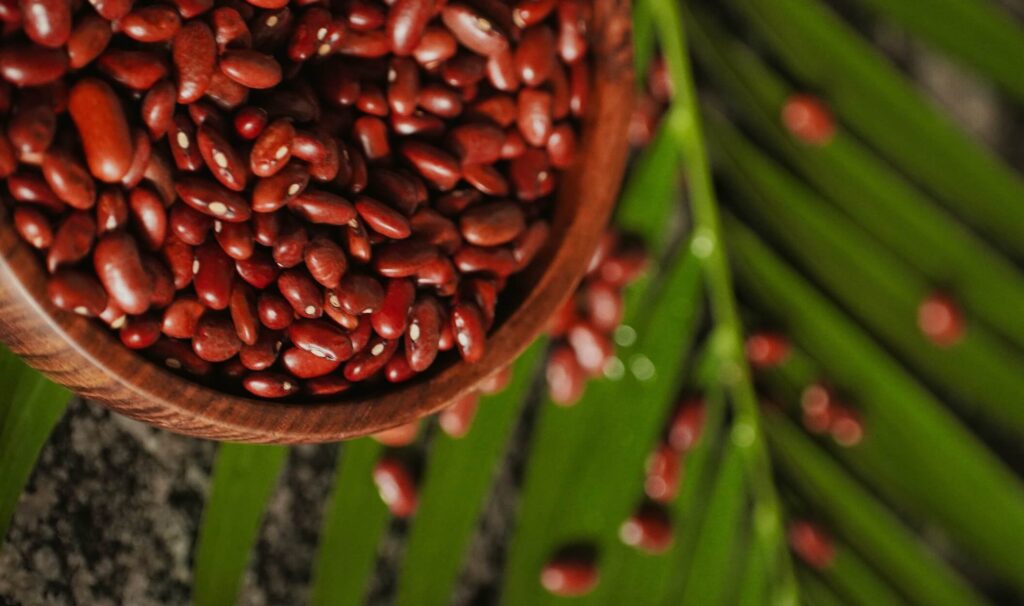
15. Chickpeas or Garbanzo beans –
The legume family includes chickpeas, also referred to as garbanzo beans. Per 100 grams of cooked chickpeas, there are 27.4 grams of carbohydrates and nearly 8 grams of fiber. Additionally, they provide a good source of plant-based protein. Iron, phosphorus, fiber and B vitamins are just a few of the vitamins and minerals found in chickpeas. According to some studies, chickpeas may also provide some cancer protection in addition to being linked to better heart and digestive health.
16. Lentils –
Phosphorus, potassium, calcium, and folate are all abundant in lentils. Popular high-protein legumes include lentils. A cup of boiled lentils contains 17.9 g of protein, 15.6 g of fiber, and 39.8 g of carbohydrates.
E. High carb dried fruits:
The following dried fruits can be consumed alone as a snack or combined with other foods to make a meal or trail mix.
17. Dates –
Dates come in a variety of flavors and are naturally sweet enough to be eaten as a dessert or sweet snack. Dates are tasty, dried fruits that are good sources of carbohydrates and fiber as well as micronutrients (vitamins and minerals). Two Medjool dates yield 3.2 grams of fiber, or about 12% of the Daily Value. Dates, like oats, contain soluble fiber that lowers LDL cholesterol. They also contain insoluble fiber, which aids in maintaining a healthy digestive system.
Dates contain essential micronutrients like non-heme iron, calcium, fiber, phosphorus, vitamin A, B vitamins, potassium, copper, and magnesium. Take pleasure in them chopped up in salads or rice dishes or as a filling nut butter-filled snack.
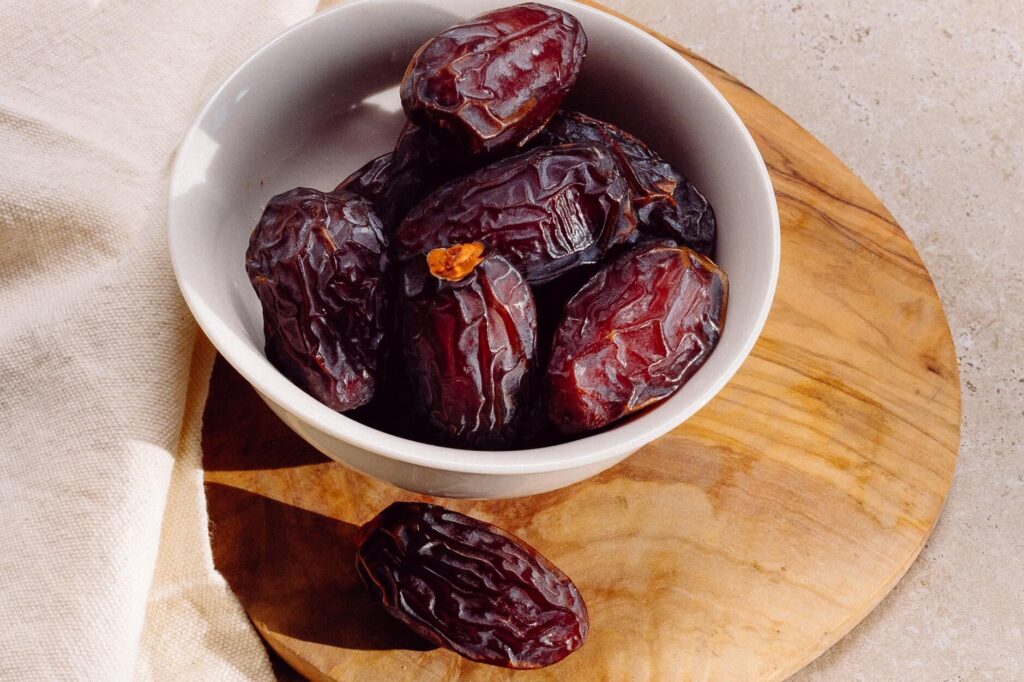
18. Raisins –
Dried grapes known as raisins can be eaten as a standalone snack or used to flavor and add texture to granola, yogurt, salads, and cereal bars. 130 g of carbohydrates are contained in one cup of raisins. They also contain calcium, phosphorus, magnesium, and potassium. Antioxidants are also abundant in raisins. Antioxidants are organic compounds that can lessen the rate at which free radicals harm cells.
What are high carb foods to limit or avoid?
For a healthy diet, people should limit or avoid refined carbohydrates with little to no nutritional value. Many of the nutrients in carbohydrates are lost during processing or refinement.
High-carb foods like candy, sugary cereals for breakfast, white pasta, white bread, white rice, cookies, muffins, and other baked goods, as well as flavored and sweetened yogurt, should be avoided.
• Sodas; sugary juices
• Foods and beverages high in refined sugar;
• processed foods;
• Foods and beverages high in high fructose corn syrup;
Conclusion:
The general rule of thumb is to eat whole foods and avoid processed and refined carbs. Usually, whole foods rich in carbohydrates provide your body with a wide range of nutrients and health advantages. If you have a specific health condition or concern, it is best to consult your doctor or a Registered Dietitian to determine the best foods for you. It is not true that all carbs are bad. In fact, many of the most nutritious foods contain a high amount of carbohydrates.
However, if you are on a low carbohydrate diet, you should not eat too many carbohydrates. Refined carbohydrates, such as white bread or pasta, can be very harmful in large amounts. However, these wholesome and delicious carbohydrates can be incorporated into a whole foods-centered diet.
FAQ:
Why you should reduce carbs?
Carbohydrates are an excellent source of energy for people who are active, while those who are sedentary should limit their carbohydrate intake. On average, adults should consume 130 g of carbohydrates each day, which is between 45 and 65 % of their total calorie intake. Studies have shown that a high-carb diet can increase the risk of low physical activity levels, obesity, chronic disease, and other health issues.
It is important to remember that the value of carbohydrates is more important than its quantity. Added sugars, processed grains, and refined grains may increase the risk of obesity and diabetes, as well as cardiovascular disease and certain types of cancer. When grains are processed or refined, many nutrients are lost and most of the fiber is lost, making them less nutritious but longer shelf life than whole grains.
Examples of processed grains include wheat, barley, and oats. Moreover, some of examples of healthy carbohydrates include whole grains, unsaturated vegetables, unsaturated oils, unsaturated fats, and unsaturated fats.
What are health effects of limiting carbohydrates?
Along with protein and fats, carbohydrates are one of the essential nutrients that the body requires. A diet that balances all of the major nutrients is typically the healthiest one that a person can consume. Low-carbohydrate diets are, however, supported by some individuals in specific situations.
- Blood sugar control – People with type 2 diabetes can better control their blood sugar levels by limiting their carbohydrate intake. Before making significant dietary changes, people with type 2 diabetes should speak with their doctor to discuss all available treatment options.
- Weight loss – Restricting your intake of carbohydrates may help you lose weight quickly. The rate of weight loss slows down over time, and part of this is due to water loss in the beginning stages. Before beginning any restrictive dieting, people should always speak with a doctor.
- – According to some studies, a low-carb diet can raise HDL cholesterol levels. This is frequently referred to as “good” cholesterol. Research on the relationship between carbohydrates and low-density lipoprotein, or “bad” cholesterol, is still debatable and lacking in solid evidence.
The body requires carbohydrates to function properly. Without a sufficient nutrition plan, cutting out carbohydrates can result in nutritional imbalances. Only after consulting a doctor should a person reduce the amount of carbohydrates in their diet.
Reference used:
https://www.healthline.com/nutrition/12-healthy-high-carb-foods
https://www.medicalnewstoday.com/articles/323110#healthful-high-carb-foods
https://www.goodhousekeeping.com/health/diet-nutrition/g26860631/healthy-carbs/


